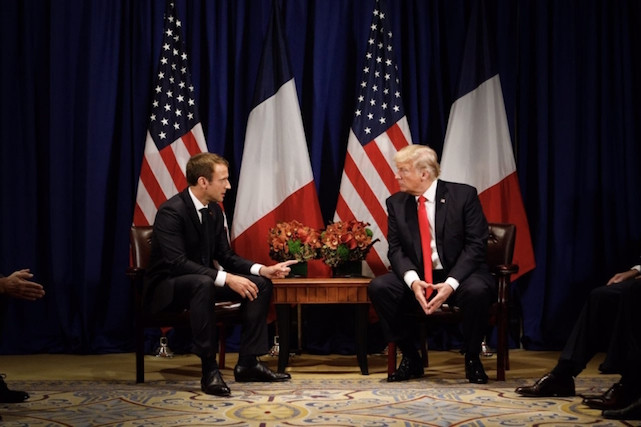The stakes are high, with Macron expected to raise future plans on Syria after the recent joint missile strikes, as well as France’s determination to preserve the Iran nuclear deal which Trump wants to quit. Macron said last week that he had convinced Trump to keep troops in Syria for the long term but was quickly rebuffed by the White House.
But Elysée officials said the highly choreographed visit, including an intimate dinner with the Trumps at Mount Vernon, was aimed foremost at cementing what they called an “intense, close relationship built on trust”, underlined by Macron and Trump’s daily phone conversations over Syria strikes.
Macron’s drive for influence in Washington is built on a surprisingly close relationship forged between two men who would appear polar opposites.
Trump, 71, is an anti-globalist and a protectionist elected on a pledge to put America First, who had once appeared to favour Macron’s opponent, the far-right Marine Le Pen. Macron, 40, believes in a kind of cosmopolitan globalism and is an ardent pro-European.
The intellectual French president is the same age as Trump’s eldest son, Donald Jr, and believes a head of state should read literature or philosophy every night lest they lose touch with reality. US observers wonder if Trump can finish a book. And yet Macron, driven by a keen sense of pragmatism, has built up perhaps the closest personal relationship to Trump of any world leader.
“What’s the secret of Trump whispering in 2018?” asked Gérard Araud, the French ambassador to Washington, as he attempted to sum up the Macron-Trump relationship at an Atlantic Council event in Washington this month. He acknowledged that although the presidents had different personalities, they were both “disruptors” whose elections had surprised and challenged the old political order in their countries. And both men can be brutally frank. “Donald Trump has never hidden what he thinks, and Emmanuel Macron is the same – so they have built a dialogue,” he said.
But the American media talk of “bromance” irks French diplomats who view the smiling and backslapping on display when Macron grandly invited Trump to Paris’s Bastille Day military parade last summer as just clever, logical diplomacy. “No it’s not ‘bromance’,” Araud said. “It’s simply that there is a common interest on both sides to reach an understanding. Any French president wants to have a good relationship with the president of the US. It’s nothing new.”
Macron’s notorious white-knuckled handshake of Trump at their first meeting has given way to honouring and flattering the US president, namely with the summer visit to Paris and dinner at the Eiffel Tower. The two men talk in English, without intermediaries, a nod to Macron’s belief that Trump is “not a classical politician”.
Although they agree on some key topics – such as counter-terrorism and Syria – they maintain what diplomats call “gentlemen’s disagreements” on others, including Trump’s resolve to leave the Paris climate accord, the Iran nuclear accord and economic protectionism.
Crucially, the Macron-Trump relationship has flourished while other traditional US allies appeared weakened: Germany during its long wait to form a government and the UK where Theresa May has not capitalised on the traditional London-Washington “special relationship”. Macron believes that the rules-based, western-dominated world order is being challenged, and France – a nuclear power and permanent member of the UN security council – has to be well-placed to respond.
“The word I use about Macron is neorealist,” said François Heisbourg, the chairman of the International Institute for Strategic Studies. “Macron understands that we live in a Trumpian world – because it’s not only Trump, it’s Russia’s Putin, Turkey’s Erdoğan, Egypt’s Sisi, China’s Xi Jinping. And Macron is rather good at playing the horse whisperer’s role with these kind of individuals. He is the only European political executive leader who is on speaking terms with all those people.”
But the question remains as to how much Macron has actually achieved in swaying Trump’s thinking. “Sometimes I manage to convince him, sometimes I fail,” Macron said earlier this year.
Laurence Nardon, head of the US programme at the French Institute of International Relations (IFRI), said: “Macron has said several times that he wanted to change Trump’s mind, for example on climate issues, trade barriers, the Iran nuclear accord. But so far in terms of concrete results, the results are limited, except on trade barriers, where negotiations are progressing.
“France hasn’t had an impact on changing American positions on climate change or the Iran deal for the moment. So the strategy hasn’t worked. But that is to be expected, because the reality is that Trump makes his decisions on issues such as protectionism, anti-environmentalism and Iran for reasons of internal politics, to please his own electorate. He is unlikely to change his views before the November midterms.”
She added: “And yet on the French side, it seemed a sound policy to try to influence America’s view. It was a chance that France had to take.”
Macron’s state visit is also about styling himself as a bridge to Europe for Trump. Germany’s Angela Merkel will visit Washington shortly after, reflecting European concerns on steel tariffs and the Iran deal.
“The Macron-Trump relationship translates as the French desire to be at the centre of the game,” said Thomas Snégaroff, a historian at Paris’s Sciences Po university. “Paris can’t envisage the progress of multilateralism at a world level without the US, the biggest power in the world.”
Angelique Chrisafis in Paris
